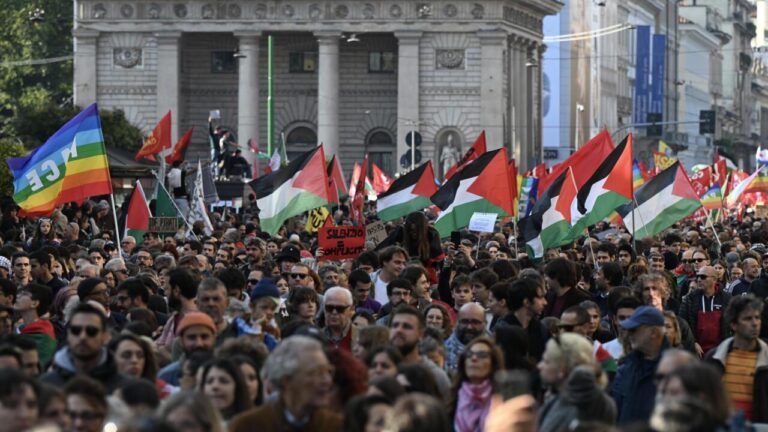Protests have intensified across Italy as demonstrators rally against Israel’s ongoing military offensive in Gaza. From major cities to smaller towns, thousands have taken to the streets expressing solidarity with Palestinians and condemning the escalation of violence. The demonstrations reflect a growing wave of public concern and political debate over the conflict, highlighting Italy’s role and response in the broader international discourse surrounding the crisis.
Protests Escalate Across Major Italian Cities Demanding Ceasefire in Gaza
- Peaceful marches beginning at central squares and government buildings
- Vigils held at night to honor the victims of recent airstrikes
- Coordination through social media to maximize impact and coverage
- Appearance of prominent public figures voicing solidarity
| City | Estimated Participants | Main Demand |
|---|---|---|
| Rome | 15,000+ | Immediate international ceasefire |
| Milan | 12,000+ | Humanitarian corridors |
| Naples | 8,000+ | End to military aggression |
| Turin | 7,500+ | Peace negotiations |
Analyzing the Political and Social Drivers Behind Italy’s Response to the Conflict
Italy’s multifaceted response to the Gaza conflict stems from deeply ingrained political dynamics and a vibrant social landscape. On one side, the government seeks to balance its traditional alliance with Israel against growing public pressure and solidarity movements advocating for Palestinian rights. This delicate political tightrope is influenced heavily by Italy’s coalition politics, where right-wing factions tend to support Israel’s offensive under the banner of counterterrorism, whereas left-leaning parties and progressive groups demand a more humanitarian approach. These divisions are increasingly visible in parliamentary debates and media discourse, reflecting a nation grappling with its foreign policy identity amid regional instability.
Socially, the swelling protests in cities like Rome and Milan spotlight the grassroots activism shaping public opinion. Key factors fueling this mobilization include:
- Historical ties: Italy’s large Palestinian and Arab diaspora communities actively organize demonstrations and influence public dialogue.
- Media coverage: Extensive reporting and digital campaigns shed light on the humanitarian consequences of the offensive, galvanizing youth participation.
- Religious solidarity: Interfaith coalitions amplify calls for peace and justice, transcending political lines.
These drivers create a complex web of opinion that compels Italian leaders to reconsider diplomatic approaches, balancing international commitments with domestic demands for peace and respect for human rights.
| Political Faction | Position on Conflict | Influence Level |
|---|---|---|
| Right-Wing Coalitions | Support Israel’s military operations | High |
Italy’s Response to the Gaza Conflict: Political and Social Dynamics
Italy’s multifaceted response to the Gaza conflict stems from deeply ingrained political dynamics and a vibrant social landscape. On one side, the government seeks to balance its traditional alliance with Israel against growing public pressure and solidarity movements advocating for Palestinian rights. This delicate political tightrope is influenced heavily by Italy’s coalition politics, where right-wing factions tend to support Israel’s offensive under the banner of counterterrorism, whereas left-leaning parties and progressive groups demand a more humanitarian approach. These divisions are increasingly visible in parliamentary debates and media discourse, reflecting a nation grappling with its foreign policy identity amid regional instability.
Socially, the swelling protests in cities like Rome and Milan spotlight the grassroots activism shaping public opinion. Key factors fueling this mobilization include:
-
- Historical ties: Italy’s large Palestinian and Arab diaspora communities actively organize demonstrations and influence public dialogue.
-
- Media coverage: Extensive reporting and digital campaigns shed light on the humanitarian consequences of the offensive, galvanizing youth participation.
-
- Religious solidarity: Interfaith coalitions amplify calls for peace and justice, transcending political lines.
These drivers create a complex web of opinion that compels Italian leaders to reconsider diplomatic approaches, balancing international commitments with domestic demands for peace and respect for human rights.
Political Factions and Positions on the Gaza Conflict
| Political Faction | Position on Conflict | Influence Level |
|————————|——————————————|—————–|
| Right-Wing Coalitions | Support Israel’s military operations | High |
| Left-Wing Parties | Advocate for humanitarian ceasefire and Palestinian rights | Medium to High |
| Centrist Parties | Call for balanced diplomatic engagement | Medium |
| Progressive Groups | Push for immediate peace negotiations and aid | Medium |
If you’d like, I can also provide analysis of how these dynamics might evolve or suggest ways Italy’s foreign policy could adapt in this context. Let me know!
Calls for Government Action Emphasize Humanitarian Aid and Diplomatic Intervention
- Increased diplomatic pressure on all parties involved to halt violence
- Collaboration with international organizations to oversee ceasefire enforcement
- Facilitation of peace negotiations that prioritize human rights and regional stability
| Action Item | Priority |
|---|---|
| Send emergency medical aid | High |
| Support UN peacekeeping initiatives | Medium |
| Engage in multilateral talks | High |
| Implement refugee assistance programs | Medium |
Key Takeaways
As demonstrations continue to unfold across Italy, the growing public outcry highlights the complex and deeply emotional responses to the ongoing conflict in Gaza. Observers note that these protests not only reflect widespread solidarity with Palestinian civilians but also contribute to the broader international discourse surrounding the violence. Authorities in Italy remain vigilant as they balance the right to peaceful assembly with the need to maintain public order. The situation remains fluid, and the evolving demonstrations underscore the global reverberations of the crisis in the Middle East.




